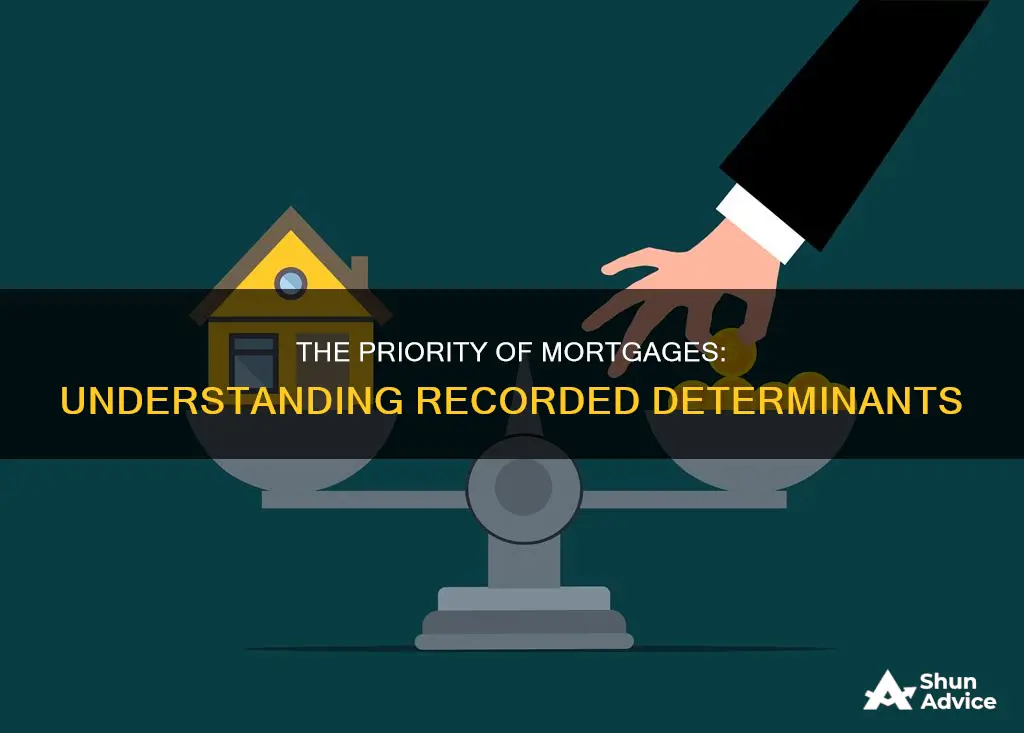
When it comes to mortgages, priority is determined by the first creditor to record their interest. This is known as the 'first in time, first in right' rule, which means that the first creditor to record their interest in the property will be the first to collect their interest in the event of a foreclosure. The recording of mortgages is done by filing a legal document in a particular county office, usually with the auditor, recorder, or register of deeds. This is an important step for the mortgagee (creditor) to ensure their interest in the debtor's real estate is protected in case of default. However, there are exceptions to this rule, such as in the case of purchase money mortgages, where the vendor's mortgage may take priority over a third-party mortgage. Additionally, certain types of liens, such as super liens, may take precedence over the mortgage, depending on the state and the circumstances.
| Characteristics | Values |
|---|---|
| General rule of priority | First in time, first in right |
| How to achieve first right | Be the first to give notice of the secured interest |
| Notice for real property | Recording the mortgage |
| Recording | Giving public notice of changes in interests in real estate |
| Where to record | A particular county office, usually the auditor, recorder, or register of deeds |
| Exception to the general rule | Fixture-filing provision in Article 9 of the UCC |
| Priority in real property security | First creditor to record its interest prevails over subsequent creditors |
| Priority in lien | Determines the order in which creditors get paid following a foreclosure |
| Super lien | Given higher priority than other types of liens |
| HOA and COA liens | Given higher priority than even the first-mortgage holder |
| Mechanic's lien | Can sometimes get priority over other types of previously recorded liens |
| Involuntary liens | Placed against a person or property without the owner's approval |
What You'll Learn
- The first creditor to record its interest prevails over subsequent creditors
- Liens are placed against a person or property without the owner's approval
- A mortgage is valid between parties whether or not it is recorded
- A buyer should record the contract to protect against the seller's attempt to convey title to a third party
- A creditor must record their interest in the debtor's real estate

The first creditor to record its interest prevails over subsequent creditors
When it comes to mortgages, priority is a crucial concept. It determines which creditor has the first claim on a property if the debtor defaults. This is important for both the debtor and the creditor, as it impacts the outcome in the event of a default.
The basic rule of priority is that the first creditor to record their interest in the debtor's real estate has the highest priority. In other words, the first creditor to officially file a legal document, such as a mortgage or a deed, notifying the public of their interest in the property, gets to be the first in line to be repaid in the event of a default. This is often referred to as "the first in time, first in right" principle.
For example, let's consider a scenario where an individual, Jimmy, mortgages his property to Mrs. Calabash in exchange for an immediate loan of $20,000, with the agreement that the mortgage will serve as security for future loans. Mrs. Calabash records this mortgage. However, a month later, before providing any additional funds, Jimmy gives a second mortgage to Louella for a $10,000 loan. Louella also notifies Mrs. Calabash about her loan to Jimmy. Subsequently, Mrs. Calabash lends Jimmy another $20,000. Unfortunately, Jimmy defaults on his loans, and his property is valued at only $40,000. In this case, since Mrs. Calabash recorded her interest first, she will be the first creditor to be repaid, followed by Louella.
It is worth noting that there are exceptions and nuances to the priority rules. For instance, in some cases, liens, such as real estate tax liens or mechanics liens, may take precedence over mortgages, depending on the specific circumstances. Additionally, the type of mortgage, such as a purchase money mortgage, can also impact priority.
Mortgage Payment Options After a Borrower's Death
You may want to see also

Liens are placed against a person or property without the owner's approval
In the context of mortgages and property, a lien is a claim placed on a property by a creditor to secure the payment of a debt. Liens are generally placed by creditors with the owner's approval, but there are cases where liens are placed without the owner's consent, known as involuntary liens. These can occur when a homeowner fails to make payments or meet other financial obligations, such as unpaid taxes or contractor work. Involuntary liens can have serious consequences, including high fines and foreclosure.
In the case of involuntary liens, creditors are generally required to make reasonable attempts to notify property owners. However, there are instances where homeowners are unaware of the lien until they try to refinance or sell their property. This lack of knowledge can be detrimental, as liens can prevent the sale or refinancing of a home. Therefore, it is essential for homeowners to be proactive in checking for any liens on their property.
The priority of liens and mortgages is crucial in determining the order of interest collection. The general rule for real property security is that the first creditor to record their interest has the highest priority. This is known as the "first in time, first in right" principle. However, there are exceptions, such as in the case of real estate tax liens, which often take precedence over mortgages.
The placement of liens without the owner's approval can be complex and vary across states and local governments. For example, in some states, a contractor can place a construction lien, or mechanic's lien, on a property for unpaid work. However, specific requirements must be met, and any missteps can invalidate the lien. It is important for property owners to understand the laws and regulations specific to their location to protect their interests.
To summarise, involuntary liens can be a significant concern for property owners, potentially impacting their financial stability and ability to sell or refinance their homes. While creditors are generally required to notify owners, it is essential for homeowners to stay informed and take proactive measures to safeguard their property and financial interests.
Understanding APR Determination for Your Mortgage
You may want to see also

A mortgage is valid between parties whether or not it is recorded
A mortgage is a big step, and it is crucial to understand the legal requirements. In most cases, a mortgage is valid between the parties whether or not it is recorded. However, recording a mortgage is essential to protect the interests of both the mortgagor (debtor) and the mortgagee (creditor).
Recording a mortgage involves officially filing a legal document to notify the public of any changes in interests in real estate. This process is typically done by transferring the title or mortgage to a specific county office, such as the auditor, recorder, or register of deeds. While recording is not necessary for the validity of the mortgage, it serves as a protective measure. If a mortgage is not recorded, the mortgagee risks losing out to a third party, such as another mortgagee or a good-faith purchaser of the property.
The priority of a mortgage, or who gets the first interest in the property in case of default, is determined by the timing of recording. The general rule of priority follows the principle of "first in time, first in right." This means that the first creditor to record their interest in the property will have a higher priority claim than subsequent creditors. This is particularly important when dealing with multiple mortgages or liens on the same property.
In some cases, certain types of liens may take priority over a mortgage, even if the mortgage was recorded first. For example, real estate tax liens resulting from unpaid taxes are typically considered first priority liens. Additionally, in rare cases, mechanics' liens may take precedence over a mortgage if the goods were delivered to the property before the recording date of the mortgage.
It is worth noting that the specific laws and requirements regarding mortgages and their recording can vary depending on the state and jurisdiction. Therefore, it is always advisable to consult with a real estate attorney or legal professional to ensure compliance with the relevant laws and to protect one's interests.
Mortgage Reserves: Critical for Home Loan Approval and Peace
You may want to see also

A buyer should record the contract to protect against the seller's attempt to convey title to a third party
Recording is the act of giving public notice of changes in interests in real estate. It is important for a buyer to record the contract to protect against the seller's attempt to convey title to a third party. This is because, in the case of real property security, the first creditor to record its interest takes priority over subsequent creditors.
In the context of mortgages, recording is important for determining priority in the event of default. The general rule of priority is that the first in time to give notice of a secured interest is the first in right. This means that if a mortgagee (creditor) does not record their interest in the debtor's real estate, they risk losing out to another creditor who subsequently records their interest.
In the case of a buyer recording a contract, they are protecting themselves from any attempts by the seller to convey title to an innocent third-party purchaser while the contract is in effect. This is especially important in a contract for deed, where the seller retains legal title to the property until the contract price is paid in full. If the buyer defaults on the contract, they could lose their money and their title rights to third parties who rely on the recorded state of the title.
To record a contract, the buyer should file the deed with the county recorder in the county where the land is located. This helps establish the buyer's interest in the property and protects them from potential issues with the seller conveying title to another party. It is worth noting that the specific procedures and timelines for recording may vary depending on state law.
The Intricacies of Securing a Mortgage: What You Need to Know
You may want to see also

A creditor must record their interest in the debtor's real estate
Recording is the act of giving public notice of changes in interests in real estate. It was created by statute and did not exist at common law. The typical recording statute calls for a transfer of title or mortgage to be placed in a particular county office, usually the auditor, recorder, or register of deeds.
In the context of mortgages, recording ensures that the mortgagee (creditor) has a valid claim to the property in case of default by the mortgagor (debtor). By recording their interest, the mortgagee can establish their priority over other creditors and protect their interest in the property.
It is important to note that there may be exceptions to the general rule of priority. For example, in the case of a purchase money mortgage (PMM), where the seller of real estate is selling on credit, it may take priority over a third-party PMM (bank-financed loan) even if the third-party PMM was recorded first. Additionally, certain liens, such as real estate tax liens or mechanics liens, may take priority over a mortgage, depending on the specific circumstances.
Overall, recording is a crucial step for a creditor to protect their interest in the debtor's real estate and establish their priority in the event of default or competing claims.
Paying Off My Mortgage: Strategies for Early Freedom
You may want to see also
Frequently asked questions
The basic rule of priority is that the first creditor to record its interest prevails over subsequent creditors.
The first step is to understand the lien priority, which determines the order in which creditors get paid following a foreclosure.
The principle states that the first mortgage recorded in the land records has a higher priority than later recorded mortgages or liens.
A super lien is a category of lien that is given a higher priority than other types of liens, including first-mortgage holders. Examples include HOA and COA liens in Nevada and Massachusetts.
A priority can be altered by executing and recording a subordination agreement.







